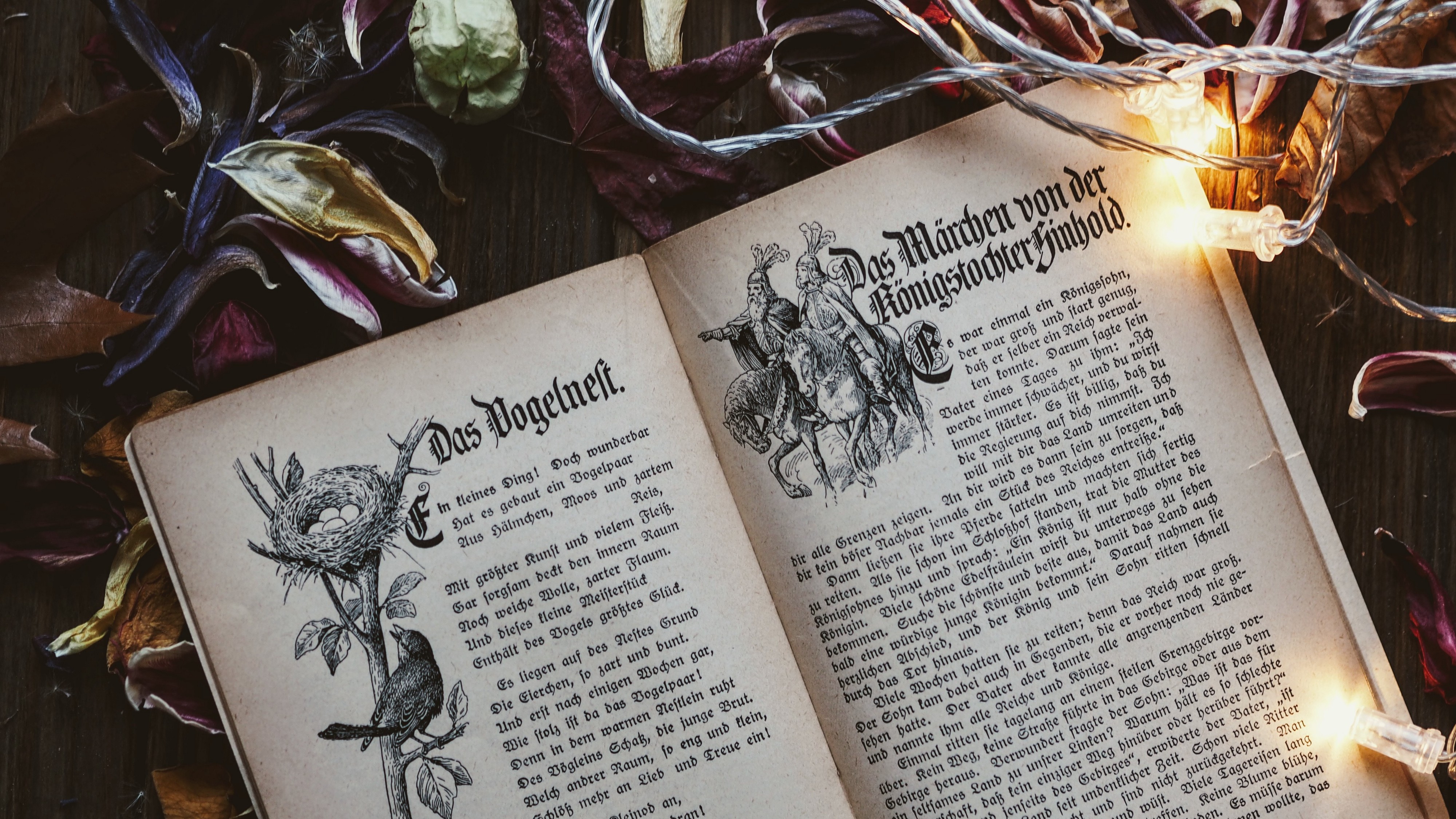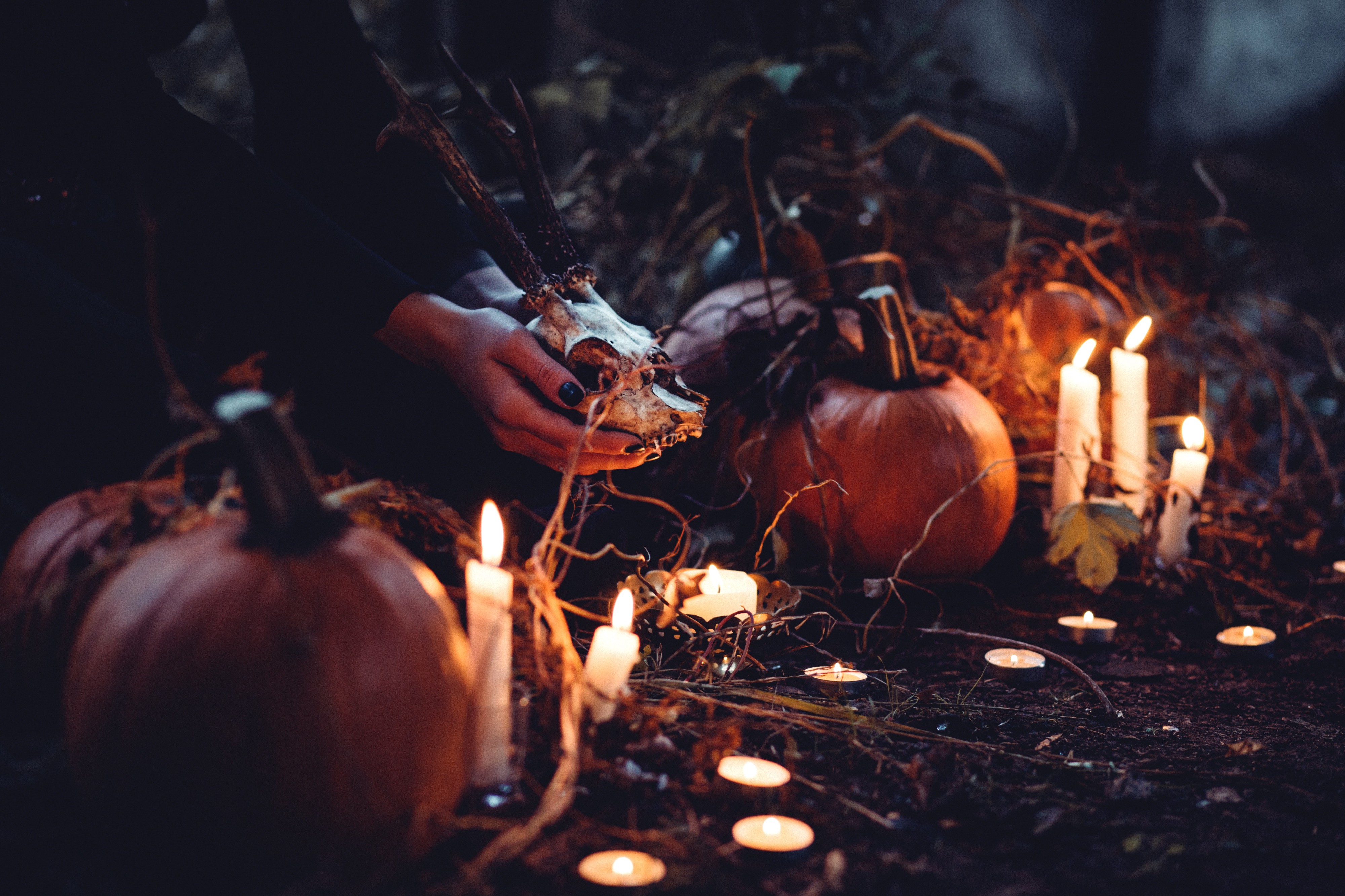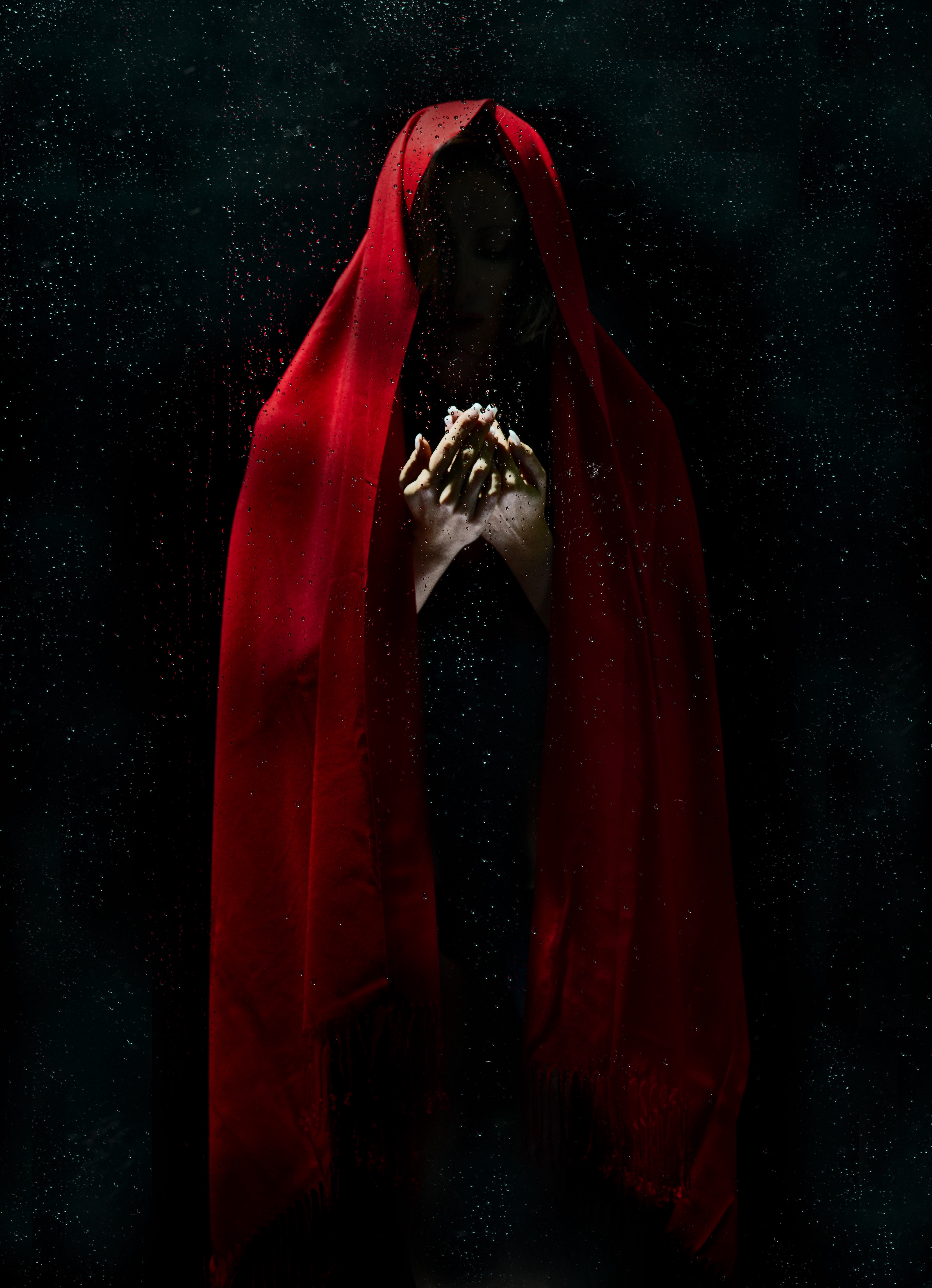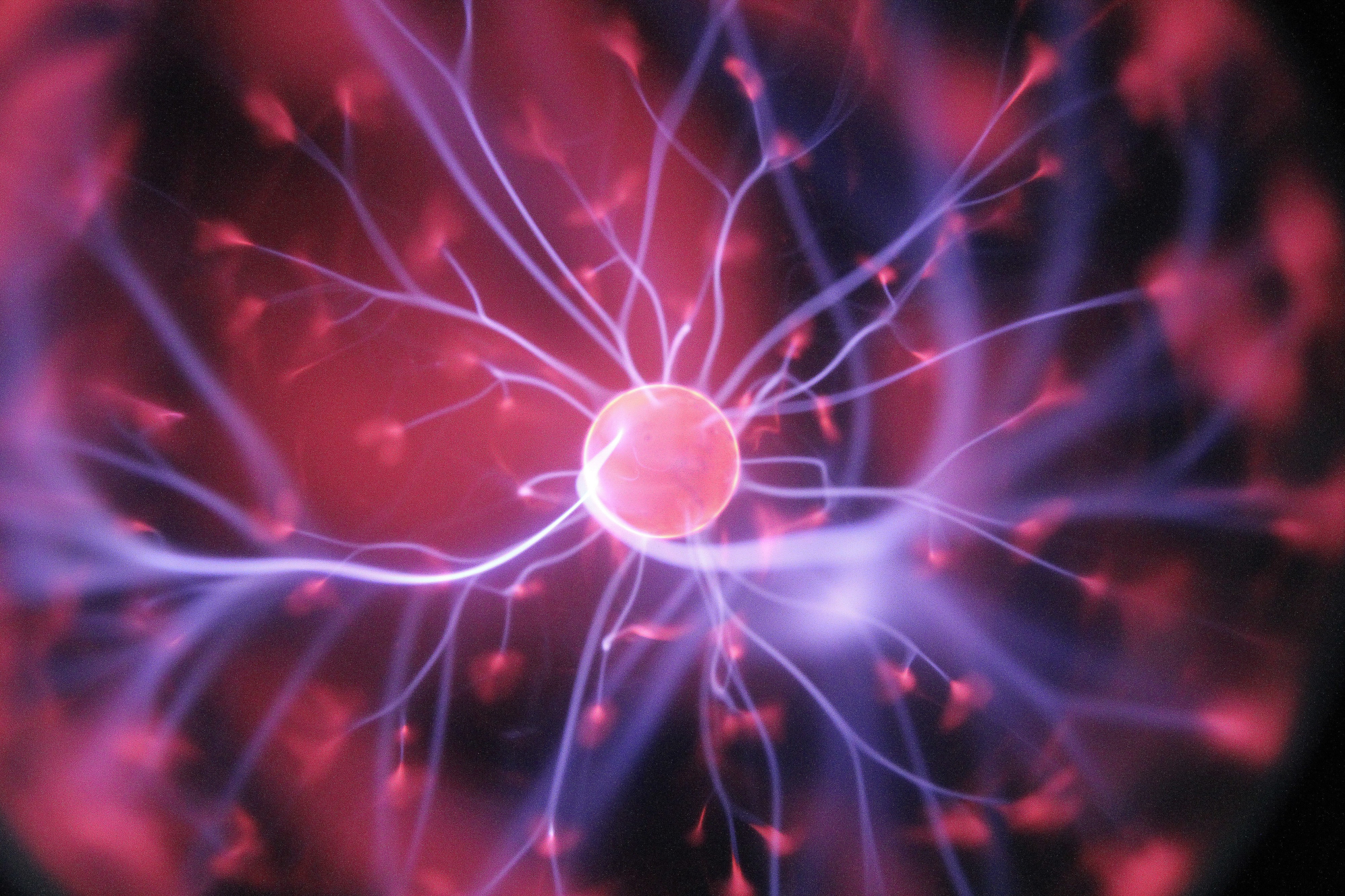Exploring The Intersection Of Two Terrifying Identities

The other week, I got an Instagram message from a stranger who had read my article ?7 Questions For A Queer Atheist Witch.? A hardline skeptic who was finding himself drawn to learning more about witchcraft, he had some really compelling questions for me. Then, the other night, I found myself in a conversation with a Christian on Twitter who was equally fascinated by the intersection of skepticism and magic. The overarching concern is always the same: How can you be an atheist and a witch at the same time?
At the most basic level, the answer is simple: ?An atheist witch is a witch who doesn?t believe in God.? But if you?ve been following this blog at all, you?ve probably noticed that atheism and witchcraft are two of my favorite topics, so why not delve headfirst into all the nuances this intersection contains? My own perspective has changed over time, as I?ve explored the history of witches and how it intersects with my skeptical worldview. I have come away with some ideas that feel good to me. Hopefully this post will lay out those ideas in a cohesive way and inspire even more questions!
Make sure you?re sitting somewhere comfortable and have plenty of tea ?we?re going on an adventure.
Witch or Wiccan?
First off, let?s get some quick terminology out of the way. I?ve laid this out in previous posts, but it?s worth bearing in mind moving forward, because (despite the label fatigue happening in our culture currently) what you call things are important. There are reasons people pick one word over another. What I call myself is based firmly in subtle distinctions between terms, distinctions that I find important to an internally cohesive intersectionality.
I am a witch, not a Wiccan. Wicca treats witchcraft as a religion (there are even U.S. court rulings that classify it as such). Wiccans traditionally worship the God and Goddess deities (or sometimes the triple Goddess). Covens are often led by priests and priestesses, and you?ll hear them using god names frequently in chants and rituals: Isis, Astarte, Diana, Hecate, Demeter, Kali, Inanna.
I do find the symbolism of Goddess worship emotionally powerful, and value its ability to reorient traditional perceptions of what it means to be a woman. I also prefer the way Wiccans approach the concept of gods, often choosing to commune rather than kowtow. They treat them with an easy (if reverent) friendship instead of a worshipful subordination. Think parent-adult child relationship rather than the parent-small child relationship so prevalent in monotheistic religions. They are there if you need them, but they don?t try to tell you how to live your life. If there were an ethical god model that truly harmed no one by its existence, it would be this one.
That said, I simply don?t find the idea of gods believable or useful, and so I choose not to include them into my practice. I would also personally feel uncomfortable at the idea of a priest or priestess presiding over my craft. As an atheist who left religion, such a structure and mindset simply aren?t appetizing to me.
Witchcraft extends beyond Wicca and was practiced long before it was reintroduced to modern society by Gerald Gardner (Scire) in the 1940?s and popularized by the Neopagan movement and second wave feminism forty years later. In the Venn diagram of witchcraft, ?Wiccan? lives as a smaller circle within the bigger circle of ?witch.?
The word ?witch? has many definitions, as we?ll see in the next section. For now, the differentiation is this: Wiccans are members of the religion of Wicca, whereas witches don?t have to be. Witches can be of any religion or no religion, because it is a practice and not a belief system. In my case, being a witch has nothing to do with supernatural beliefs or the worship of higher powers. More on that later.
The Social-Etymological Evolution of the Witch
The social-etymological evolution of the word ?witch? is especially fascinating and diverse. In fact, it is so varied in meaning that one could argue that anyone could be a witch. Which, as it turns out, is true. History has lumped a whole host of people (mostly women) into this category, often just because they couldn?t categorize them as something else more comfortable: orthodox, traditional, racially homogenous, male, married, submissive, attractive, etc.
But what are some of the actual etymological origins? Where does the word come from, and what definitional through lines can we find between them? Best to start at the beginning, about 30,000 years ago.
The Woman and the Snake: Prehistory
This section relies a bit heavily on biblical and pre-biblical history, so follow closely. When denouncing witchcraft and sorcery, the Masoretic Text of the Torah forbids ?nahash? (Leviticus 19:26, Deuteronomy 18:10?11). Now, ?nahash? translates to ?snake,? which might make you think back to the Genesis story of the first woman (Eve), who disobeyed YWHW and allied herself with the Serpent in the pursuit of god-like powers. Her rebellion ultimately brought about the Fall, the catalyst for all Abrahamic religions.
Now, before 3000 BCE, when invaders from Northern Indoeurope began conquering Africa and the Middle East and instituting their relatively recent Sky Father mythologies, the primary religion was Goddess worship. God, in other words, was a woman for about 15,000 years before the Abrahamic deity was born. And Her counterpart was often depicted as ? can you guess? ? a snake. Historians like Merlin Stone suggest that the story of the Fall was not-so-subtle propaganda circulated by these Northern invaders against the more advanced and established religion of Goddess worship and the attempt to place their warring, male gods in a place of absolute power and authority.

Knowing all of this, the term ?nahash? or ?snake? in reference to witchcraft is especially powerful. It doesn?t inherently have anything to do with magic or the supernatural. In fact, it could easily have been used to mean any woman who still worshipped the Goddess, bucking the oppressive patriarchal structures of the time by questioning God?s (and man?s) supremacy. Needless to say, as a feminist athiest, this definition of ?witch? is especially poignant. (Stone?s book When God Was A Woman is a great place to discover more about this prehistorical conflict and its massive effect on the Judeo-Christian-Muslim worldview.)
Twisting and Bending: Middle Ages
Jumping about 5,000 years forward, we discover a more familiar character: the bubble, bubble, toil and trouble crones and succubi of the Middle Ages. One theory is that the word ?witch? is derived from the Old English ?wicc,? meaning to twist or bend. Thus, witchcraft is about twisting or bending what is into what you want it to be. By traditional interpretation, this suggests the witch has the ability to twist nature (conjuring rain or fire, removing penii, being able to fly) or bend the course of events (casting love spells, summoning future prosperity, hexing or cursing others). When you think of Medieval superstition, when you read The Malleus Maleficarum and note the kinds of crimes witches were accused of, they generally fall into these categories.
This imagery is powerful and can be scary, but it?s just that ? imagery. Some have even suggested that the depiction of witches using the tools of the kitchen (the broomstick, the cauldron, the athame) was meant to illustrate the perversion (or twisting) of traditional womanhood. Instead of using them to uphold societal structure and cultural expectation ? to care for their husbands and children ? witches used the menial instruments of home and hearth to pursue personal power and sometimes even revenge.
No one ever saw a witch actually consort with a demon or cause a man?s penis to magically fall off his body, but you can bet a whole lot of confused and angry men witnessed women who asserted their independence in objectionable ways: by not marrying, by not submitting to their wifely duties, by going out alone at night, by acquiring more wealth than their male counterparts, or by creating unwanted competition in male-dominated fields like medicine. Combine the sexual frustration of religious fundamentalists who viewed the female body as both desirous and fraught with spiritual danger ? a thing that twisted and bent their own lust against their piety?and you have an explanation for both the explicit and perverted sexual crimes of which witches were accused, and the sexually invasive and rapey way men would test and torture women accused of practicing magic. (Salem Possessed: The Social Origins of Witchcraft by Paul Boyer and Stephen Nissenbaum is a good read if you want to understand more about America?s persecution of witches in particular.)
A Woman In Her Power: Modern Day
In only the last fifty years or so, women have begun reclaiming the word ?witch? to mean what it has always intrinsically meant: ?a woman in her power.? Even for those who do believe in the supernatural elements of their practice, the magic of witchcraft seems secondary to the identity itself. Indeed, in her iconic work Drawing Down The Moon: Witches, Druids, Goddess-Worshippers and Other Pagans in America, Margot Adler writes: ?The first time I called myself a ?Witch? was the most magical moment of my life.? Not when she practiced witchcraft, when she adopted the name.
So how to define ?witch? by today?s social-etymological standards? Let?s take a look at some quotes from the more prominent witches of the last generation:
?If you are a woman and dare to look within yourself, you are a Witch. You make your own rules. You are free and beautiful.? ? Margot Adler
?I am a witch, by which I mean that I am somebody who believes that the Earth is sacred; and that women and women?s bodies are an expression of that sacred being.? ? Starhawk
?A witch is a wise woman aligned with the Earth, a healer. It?s a word that demands destigmatization at this crucial time in the planet?s history when we desperately need the medicine of the feminine to rise and rebalance humanity and the Earth.? ? Sarah Durham Wilson
?A Witch seeks to control the forces within her/himself that make life possible in order to live wisely and well without harm to others and in harmony with Nature.?? The American Council of Witches
?A witch, first and foremost, is a woman in her power.? ? Lisa Lister
Nothing here about magic, nothing here that would conflict with any agnostic atheistic worldview. Yes, some of the language might be a little fluffy (this resurgence did initially arise concurrent with and linked to the New Age movement), but here we find that definitional through line we were looking for. To be a witch ? especially a woman witch ? is to walk against the traditional expectation of gendered conformity and to reclaim the forbidden fruit of individual power. Witchcraft is merely the way we express or pursue that power, and each of us does so uniquely. Personally, I find it possible to pursue this power and fulfillment without believing in the supernatural or expecting to influence the world in a way incongruous with science.
That?s all well and good, you say, but what exactly is magic? Is it demon worship or energy work or something else? When you ?do? witchcraft, what is it exactly that happens, and how can you possibly link it to naturalistic origins?

Where Does Magic Come From?
Primitive people blamed witchcraft for everything: a blight, a drought, a storm, or a sudden illness. As societies became more advanced (by comparison), official church doctrine replaced folklore and used demonology to explain witchcraft in a way that corresponded with Christians? preconceived notions about the spiritual realm. Unfortunately, much of the modern world has gotten stuck at this point in the discussion, so the idea of demonic power as the source of ?magic? deserves its own section.
Witchcraft As Demonic Spiritual Warfare
According to the Church, there were only supposed to be two supernatural powers that could influence this world: God and Satan, and what was not one was by default the other. ?He who is not with Me is against Me,? Jesus says in Matthew 12:30. Because only magic done by Church priests was of God (transubstantiation, the sacraments, anointing with holy oil, baptisms, etc.), all other inexplicable phenomena was by default of the Devil and called ?witchcraft.? Demons were invoked as an explanation, and are still to this day.

The assumption of demons as the source of witchcraft inspired a host of horrible witch ?tests.? Imprisoned women were often stripped of their clothes and invasively searched and prodded in every crevice to look for a ?third nipple? which might feed her satanic comrade. If a rat, snake, or lizard was found in an imprisoned witch?s cell, it was considered a demon and she was immediately convicted. If an accused witch floated when tossed into a body of water, she was obviously possessed and executed (the only way to ?pass? the swimming test was to die of drowning). All of this, of course, was required by the godly, since ?you shall not suffer a witch to live? (Exodus 22:18).
There is a disturbing number of people who still believe that this is the case, and witches not only exist but are conspiring with Satan to do all kinds of horrible things, especially political (liberal) things. As one Alabama pastor claimed just this past August in a prayer to protect Donald Trump:
“What?s happening right now in America, is witchcraft?s trying to take this country over. It?s witchcraft that?s trying to take America back over.?
And this is just in developed nations. In developing countries, witchcraft is still met with the most extreme forms of violence. As I laid out in a previous post, in the last ten years at least 23,000 people have been accused of the ?evil? of witchcraft and either massacred or driven into hiding.
This deep and global cultural link between witchcraft and religion makes it especially difficult to comprehend the idea of an atheist witch, especially an ethical one. As an atheist and a skeptic, facts like the ones I?ve just shared deeply hurt and infuriate me. There are no demons, no Satan, no God, no supernatural realm one can exploit for power. These witches died for nothing, and the ones who killed them lived in fear of being victimized. If I were to get on my atheist soapbox, I?d suggest that witch hunts are a perfect example of how religion and irrationality run amok poisons societies and cause otherwise good people to commit horrible atrocities against their innocent neighbors.
The Preternatural Power of Nature
Modern witches (especially Wiccans) will tell you that the idea of witchcraft as devil worship is ridiculous. In 1973, the American Council of Witches put out their Principles of Belief, which gently explained their worldview to a skittish public. Article 12 of the document reacts explicitly to the charge of camaraderie with Satan:
We do not accept the concept of absolute evil, nor do we worship any entity known as ?Satan? or ?the Devil?, as defined by Christian tradition. We do not seek power through the suffering of others, nor do we accept that personal benefit can be derived only by denial to another.
Instead, they claim that their source of power is based in nature and not in the traditional understanding of the supernatural:
We acknowledge a depth of power far greater than that is apparent to the average person. Because it is far greater than ordinary it is sometimes called ?supernatural?, but we see it as lying within that which is naturally potential to all.
This is a pleasantly naturalistic description, especially for me. No gods required, just nature. However, the interpretation of this ?deep power? is often still extremely literal: hearken back to the stereotype of a witch causing a drought or summoning fire. Astral projection to other ?natural? planes of existence, crystal magic which relies on ?natural? energy vibrations, or herbal remedies that make use of ?natural? magical properties all technically fall under the ?deep power of nature,? but are still met with valid incredulity. After all, there is a dirth of scientific studies that back up such claims, and some that actively refute them. So just because we?ve moved away from the god model doesn?t mean we?re getting more rational. Any skeptical person ? witch or otherwise ? is right to raise an eyebrow at what cannot be replicated or validated through a careful, regulated scientific process.
A note here: Whether or not you believe in a god or gods has nothing to do with applied skepticism in other areas of your life. Therefore it is 100% possible for atheists to believe in crystal healing, herbal remedies, and yes, even astral projection. Assuming an atheist categorically could not believe in such things, or assuming that said person isn?t really an atheist if they do, is inaccurate.
Now, let it not be said that I claim to understand everything in the universe. The basic tenet of agnosticism (which informs and envelops my atheism) is that suspended judgement is the most intellectually honest way of interacting with the world. ?Magic,? it has been said, ?is just science we don?t understand yet.? And in that way it certainly does exist, and certainly emanates from the natural world, sometimes in inexplicable and controversial ways.
I?ll give you a brief example of how we might support the concept of the ?deep power of nature? as preternatural or experiential awareness of some concrete scientific principle. In 1854?6, French occultist author and ceremonial magician Eliphas Levi published The Doctrine and Ritual of High Magic, which attempted to lay out the basics of how magic worked. He proposed that in order to influence the world around them, magicians needed to tap into the Astral Light, a ?luidic life force that fills all space and living beings.?
That all sounds pretty woo-woo, right? I thought so too upon first reading. But then I stumbled upon a 2017 article in which some physicists propose the existence of a ?proto-consciousness field? which permeates the universe, an invisible force that at once gives rise to and is influenced by consciousness. This hypothesis is linked to the ?participatory anthropic principle,? posited by John Archibald Wheeler, the scientist who coined the term ?black hole:?
?In quantum mechanics, particles don?t have a definite shape or specific location, until they are observed or measured? In [Wheeler?s] view, every piece of matter contains a bit of consciousness, which it absorbs from this proto-consciousness field. He called his theory the ?participatory anthropic principle,? which posits that a human observer is key to the process.?
If Wheeler and others are correct ? and that?s still a big if? that sounds pretty much exactly like the Astral Light that Levi suggested. If a physicist in a lab could indeed influence or commune with matter on a subatomic level through consciousness alone, would she be doing witchcraft? No, she?d be doing science. But perhaps witches are just those individuals who figured out what worked without waiting for science to explain it. And when science makes a new discovery, witches don?t say (as some religions do): ?No, that?s a lie, do things our way!? They say: ?Aha! I knew that worked for a reason.?

A Case For Purely Psychological Magic
So if magic is not caused by demons, and probably not caused by ?the deep power of nature,? (unless you classify magic as undiscovered science), then where does it come from? Does it exist at all?
Yes, I?d posit, it does. But in the same way that self-confidence does, or jealousy does, or any other psychological state that impacts the world by inspiring action without being independently quantifiable or observable. In other words, magic is in the mind.
Of all the various interpretations of magic I?ve read, I find Margot Adler?s most similar to my own:
?Magic is a convenient word for a whole collection of techniques, all of which involve the mind. In this case, we might conceive of these techniques as including the mobilization of confidence, will, and emotion brought about by the recognition of necessity; the use of imaginative faculties, particularly the ability to visualize, in order to begin to understand how other beings function in nature so we can use this knowledge to achieve necessary ends.?
In other words, the twisting and bending of witchcraft happens in our minds: through performing rituals, through meditation and chanting, we are tapping into archetypal inference, harnessing our will, putting ourselves in a position to influence the world for better (or for worse). We can bend our own perceptions of the world in ways that promote growth, success, joy, power, creativity.
This purely psychological interpretation of magic is controversial no matter who you talk to. Religious people will say I am trying to deflect attention from the obvious demonic forces at play in my own life. Witches of all stripes will decry the suggestion that their spellwork influences only their own mental state. But perhaps I can convince you:
If you looked at the article linked above debunking crystal healing, you will have seen that ?no scientific studies on the efficacy of crystal healing.? However, ?there is a study that suggests that crystal healing may induce a placebo effect in a patient who receives this type of treatment.?
For the study, 80 participants were asked to meditate for five minutes while holding either a real quartz crystal or a fake crystal that they believed was real. Before meditating, half of the participants were primed to notice any effects that the crystals might have on them, like tingling in the body or warmth in the hand holding the crystal.
After meditating, participants answered questions about whether they felt any effects from the crystal healing session. The researchers found that the effects reported by those who held fake crystals while meditating were no different than the effects reported by those who held real crystals during the study.
Many participants in both groups reported feeling a warm sensation in the hand holding the crystal or fake crystal, as well as an increased feeling of overall well being. Those who had been primed to feel these effects reported stronger effects than those who had not been primed. However, the strength of these effects did not correlate with whether the person in question was holding a real crystal or a fake one. Those who believed in the power of crystals (as measured by a questionnaire) were twice as likely as non-believers to report feeling effects from the crystal.
While the effectiveness of the crystals themselves can be dismissed thanks to this experiment, it proves that magic lives in the brain and can generate actual physical and emotional sensations when given the right tools. And that?s what witchcraft is ultimately all about, the common through-line that all witches share: the tools we use. That?s the reason it?s called a craft.

Hijacking The Brain and Connecting With The Natural Self: A Ritual Described
At my altar, I have an incense burner, a piece of rose quartz, a scrying ball of petrified wood, a compass, a silver bell, a small cauldron, an athame (a black-handled ritual dagger), and lots and lots of candles. Inside the small cupboard I dedicate to my tools, I have a boline (a second white-handled dagger for practical chores like cutting flowers or carving sigils into other implements), a piece of intricately carved jade, a deck of tarot cards wrapped in purple silk, a bottle of water infused with lavendar oil during the 2017 solar eclipse, an assortment of dried herbs, and of course, more candles. I also have an ever-growing collection of books on both the practical and historical aspects of witchcraft, to which I turn regularly for chants, spells, and meditations.
When I feel the need to recenter myself and feel the empowerment that comes from mindful practice, I shut the lights, light the candles, put on some music in the background, and get sky clad (that means naked). I meditate, I chant, I dance, I move my athame through the air in precise motions before placing it against my forehead and allowing the buzz of energy captured at its tip to fill my brain and trickle down my backbone. It feels like pins and needles, but it comes in steady waves, each one stronger than the next, until I?m dizzy and breathless.
When this makeshift ritual is complete, I thank my tools, blow out the candles, and put the lights back on. The fuzziness in my head will last another half hour, but I feel centered, at peace, and giddy with the power and susceptibility of my own brain. Using these tools, I have effectively hijacked my own brain, giving it a much-needed break from the artificial, check-the-boxes, go-go-go, 8-hour-work-day cycle modern society demands of it. Using atmosphere, using tools whose pregnant meanings I have learned and absorbed, using phrases and thought patterns that invoke the most preternatural parts of my own animal brain, I reconnected to my natural self.
Humans were not meant to live the way we do. We are animals, part of nature, too clever for our own good. We?ve built a box for ourselves and now we live in it, forgetting that for most of our history we were deeply connected to the earth, to the change of the seasons, to the fearful safety of the darkness and the joyful celebration of the rising sun. Evolution does not work quickly enough to rid us of those needs, those tendencies, those echoes. We can pretend we don?t need our natural selves anymore, but in order to maintain our sanity, we do. For me, witchcraft is the way to do that.
When I light my candles, I marvel at how a molecular reaction stumbled upon by our unwitting ancestors changed the course of the world. When I cup my scrying ball between my palms, the petrified wood reminds me that things have existed for long before me, and will exist long after I am gone. When I shed my clothes and dance in the darkness, I remember that this is who we were for longer than we were anything else. My practice inspires in me a love and reverence for this beautiful, terrifying, paradoxical, complex, infinitesimal planet, and it connects me to the memories of all the women who came before me, who felt the same thing.
And because my brain is susceptible to influence, and because I choose to nurture that part of myself during my rituals, I experience physical and emotional effects. I get dizzy, I can feel the objects vibrating in my hand. I feel connected to the whole world and to all the women in it. It feels very much like the ?movement of the Holy Spirit? I used to experience in church, but I have managed to recapture that vital, glorious emotion without the help of any gods, without even accepting the supernatural. My atheism remains intact with no loss of internal complexity.
Call witchcraft a placebo effect, or a rush of dopamine and serotonin, or a self-fulfilling prophesy, and I will say ?Yes, indeed!? And I will also say: ?So what?? If anything is worthy of our admiration, awe, and fear, it is what the brain can do to itself when given the right tools. That?s the real magic. And when I leave the altar, I act differently thanks to this magic. I am more confident, I am less likely to be shaken by self-doubt or anger, I am optimistic and generous, and I am inspired to create the world in my own image.
I am a woman in my power.


